新视野大学英语2 第二单元课文中文翻译
新视野大学英语读写教程2--unit-2-课文原文及翻译
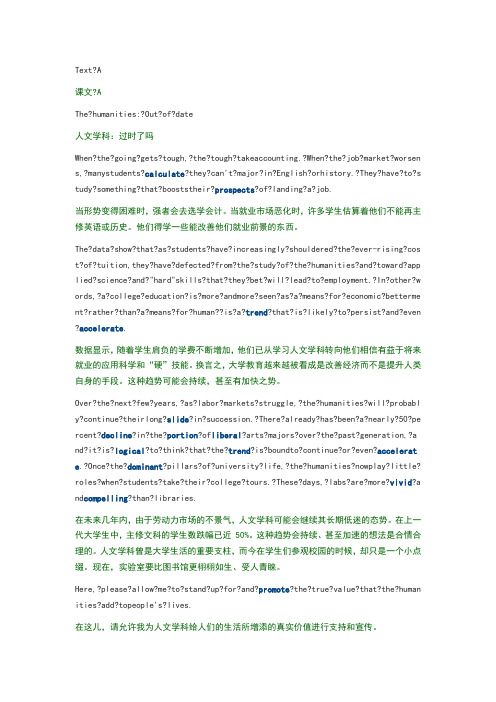
Text?A课文?AThe?humanities:?Out?of?date人文学科:过时了吗When?the?going?gets?tough,?the?tough?takeaccounting.?When?the?job?market?worsen s,?manystudents?calculate?they?can't?major?in?English?orhistory.?They?have?to?s tudy?something?that?booststheir?prospects?of?landing?a?job.当形势变得困难时,强者会去选学会计。
当就业市场恶化时,许多学生估算着他们不能再主修英语或历史。
他们得学一些能改善他们就业前景的东西。
The?data?show?that?as?students?have?increasingly?shouldered?the?ever-rising?cos t?of?tuition,they?have?defected?from?the?study?of?the?humanities?and?toward?app lied?science?and?"hard"skills?that?they?bet?will?lead?to?employment.?In?other?w ords,?a?college?education?is?more?andmore?seen?as?a?means?for?economic?betterme nt?rather?than?a?means?for?human??is?a?trend?that?is?likely?to?persist?and?even accelerate.数据显示,随着学生肩负的学费不断增加,他们已从学习人文学科转向他们相信有益于将来就业的应用科学和“硬”技能。
换言之,大学教育越来越被看成是改善经济而不是提升人类自身的手段。
新视野大学英语2 第三版Unit2-3 课文翻译
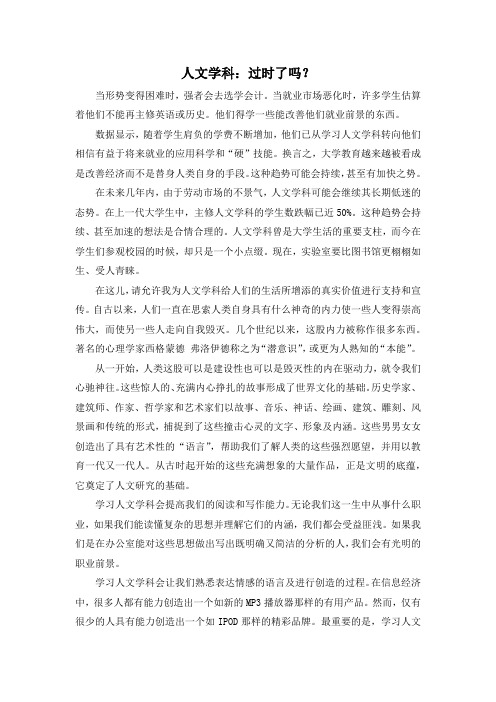
人文学科:过时了吗?当形势变得困难时,强者会去选学会计。
当就业市场恶化时,许多学生估算着他们不能再主修英语或历史。
他们得学一些能改善他们就业前景的东西。
数据显示,随着学生肩负的学费不断增加,他们已从学习人文学科转向他们相信有益于将来就业的应用科学和“硬”技能。
换言之,大学教育越来越被看成是改善经济而不是替身人类自身的手段。
这种趋势可能会持续,甚至有加快之势。
在未来几年内,由于劳动市场的不景气,人文学科可能会继续其长期低迷的态势。
在上一代大学生中,主修人文学科的学生数跌幅已近50%。
这种趋势会持续、甚至加速的想法是合情合理的。
人文学科曾是大学生活的重要支柱,而今在学生们参观校园的时候,却只是一个小点缀。
现在,实验室要比图书馆更栩栩如生、受人青睐。
在这儿,请允许我为人文学科给人们的生活所增添的真实价值进行支持和宣传。
自古以来,人们一直在思索人类自身具有什么神奇的内力使一些人变得崇高伟大,而使另一些人走向自我毁灭。
几个世纪以来,这股内力被称作很多东西。
著名的心理学家西格蒙德弗洛伊德称之为“潜意识”,或更为人熟知的“本能”。
从一开始,人类这股可以是建设性也可以是毁灭性的内在驱动力,就令我们心驰神往。
这些惊人的、充满内心挣扎的故事形成了世界文化的基础。
历史学家、建筑师、作家、哲学家和艺术家们以故事、音乐、神话、绘画、建筑、雕刻、风景画和传统的形式,捕捉到了这些撞击心灵的文字、形象及内涵。
这些男男女女创造出了具有艺术性的“语言”,帮助我们了解人类的这些强烈愿望,并用以教育一代又一代人。
从古时起开始的这些充满想象的大量作品,正是文明的底蕴,它奠定了人文研究的基础。
学习人文学科会提高我们的阅读和写作能力。
无论我们这一生中从事什么职业,如果我们能读懂复杂的思想并理解它们的内涵,我们都会受益匪浅。
如果我们是在办公室能对这些思想做出写出既明确又简洁的分析的人,我们会有光明的职业前景。
学习人文学科会让我们熟悉表达情感的语言及进行创造的过程。
新视野大学英语第二版第二册课文翻译Unit2-SectionA
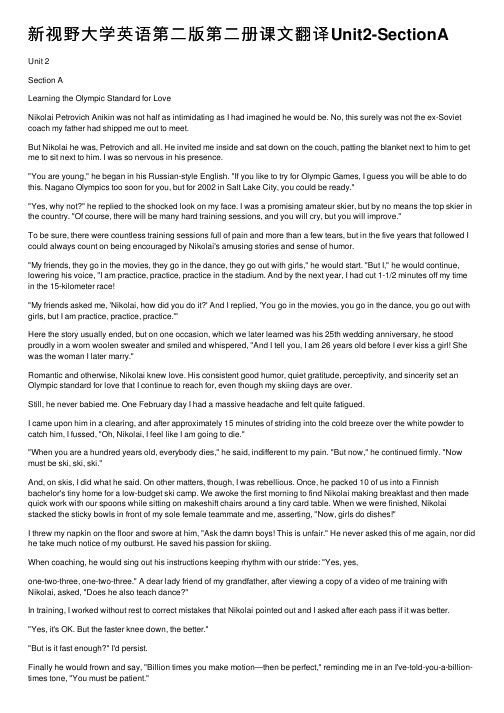
新视野⼤学英语第⼆版第⼆册课⽂翻译Unit2-SectionAUnit 2Section ALearning the Olympic Standard for LoveNikolai Petrovich Anikin was not half as intimidating as I had imagined he would be. No, this surely was not the ex-Soviet coach my father had shipped me out to meet.But Nikolai he was, Petrovich and all. He invited me inside and sat down on the couch, patting the blanket next to him to get me to sit next to him. I was so nervous in his presence."You are young," he began in his Russian-style English. "If you like to try for Olympic Games, I guess you will be able to do this. Nagano Olympics too soon for you, but for 2002 in Salt Lake City, you could be ready.""Yes, why not?" he replied to the shocked look on my face. I was a promising amateur skier, but by no means the top skier in the country. "Of course, there will be many hard training sessions, and you will cry, but you will improve."To be sure, there were countless training sessions full of pain and more than a few tears, but in the five years that followed I could always count on being encouraged by Nikolai's amusing stories and sense of humor."My friends, they go in the movies, they go in the dance, they go out with girls," he would start. "But I," he would continue, lowering his voice, "I am practice, practice, practice in the stadium. And by the next year, I had cut 1-1/2 minutes off my time in the 15-kilometer race!"My friends asked me, 'Nikolai, how did you do it?' And I replied, 'You go in the movies, you go in the dance, you go out with girls, but I am practice, practice, practice.'"Here the story usually ended, but on one occasion, which we later learned was his 25th wedding anniversary, he stood proudly in a worn woolen sweater and smiled and whispered, "And I tell you, I am 26 years old before I ever kiss a girl! She was the woman I later marry."Romantic and otherwise, Nikolai knew love. His consistent good humor, quiet gratitude, perceptivity, and sincerity set an Olympic standard for love that I continue to reach for, even though my skiing days are over.Still, he never babied me. One February day I had a massive headache and felt quite fatigued.I came upon him in a clearing, and after approximately 15 minutes of striding into the cold breeze over the white powder to catch him, I fussed, "Oh, Nikolai, I feel like I am going to die.""When you are a hundred years old, everybody dies," he said, indifferent to my pain. "But now," he continued firmly. "Now must be ski, ski, ski."And, on skis, I did what he said. On other matters, though, I was rebellious. Once, he packed 10 of us into a Finnish bachelor's tiny home for a low-budget ski camp. We awoke the first morning to find Nikolai making breakfast and then made quick work with our spoons while sitting on makeshift chairs around a tiny card table. When we were finished, Nikolai stacked the sticky bowls in front of my sole female teammate and me, asserting, "Now, girls do dishes!"I threw my napkin on the floor and swore at him, "Ask the damn boys! This is unfair." He never asked this of me again, nor did he take much notice of my outburst. He saved his passion for skiing.When coaching, he would sing out his instructions keeping rhythm with our stride: "Yes, yes,one-two-three, one-two-three." A dear lady friend of my grandfather, after viewing a copy of a video of me training with Nikolai, asked, "Does he also teach dance?"In training, I worked without rest to correct mistakes that Nikolai pointed out and I asked after each pass if it was better. "Yes, it's OK. But the faster knee down, the better.""But is it fast enough?" I'd persist.Finally he would frown and say, "Billion times you make motion—then be perfect," reminding me in an I've-told-you-a-billion-times tone, "You must be patient."Nikolai's patience and my hard work earned me a fourth-place national ranking heading into the pre-Olympic season, but then I missed the cut for the 2002 Olympics.Last summer, I returned to visit Nikolai. He made me tea... and did the dishes! We talked while sitting on his couch. Missing the Olympic Team the previous year had made me pause and reflect on what I had gained—not the least of which was a quiet, indissoluble bond with a short man in a tropical shirt.Nikolai taught me to have the courage, heart, and discipline to persist, even if it takes a billion tries. He taught me to be thankful in advance for a century of life on earth, and to remind myself every day that despite the challenges at hand, "Now must be love, love, love." (Words: 822)。
新视野大学英语2第二单元课文翻译
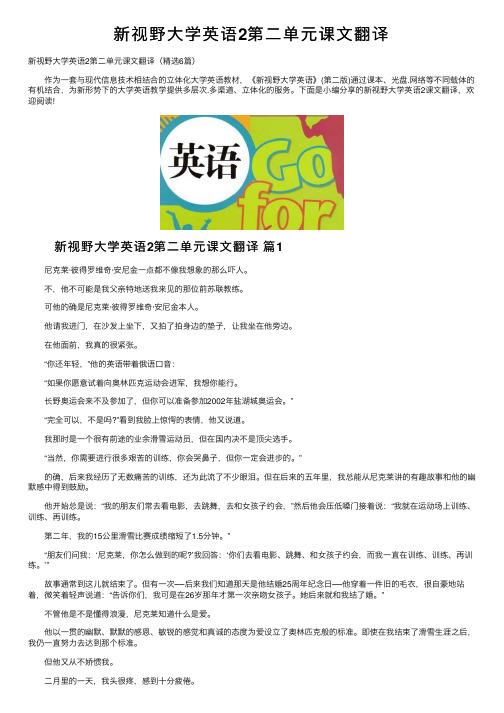
新视野⼤学英语2第⼆单元课⽂翻译新视野⼤学英语2第⼆单元课⽂翻译(精选6篇) 作为⼀套与现代信息技术相结合的⽴体化⼤学英语教材,《新视野⼤学英语》(第⼆版)通过课本、光盘.⽹络等不同载体的有机结合,为新形势下的⼤学英语教学提供多层次.多渠道、⽴体化的服务。
下⾯是⼩编分享的新视野⼤学英语2课⽂翻译,欢迎阅读! 新视野⼤学英语2第⼆单元课⽂翻译篇1 尼克莱·彼得罗维奇·安尼⾦⼀点都不像我想象的那么吓⼈。
不,他不可能是我⽗亲特地送我来见的那位前苏联教练。
可他的确是尼克莱·彼得罗维奇·安尼⾦本⼈。
他请我进门,在沙发上坐下,⼜拍了拍⾝边的垫⼦,让我坐在他旁边。
在他⾯前,我真的很紧张。
“你还年轻,”他的英语带着俄语⼝⾳: “如果你愿意试着向奥林匹克运动会进军,我想你能⾏。
长野奥运会来不及参加了,但你可以准备参加2002年盐湖城奥运会。
” “完全可以,不是吗?”看到我脸上惊愕的表情,他⼜说道。
我那时是⼀个很有前途的业余滑雪运动员,但在国内决不是顶尖选⼿。
“当然,你需要进⾏很多艰苦的训练,你会哭⿐⼦,但你⼀定会进步的。
” 的确,后来我经历了⽆数痛苦的训练,还为此流了不少眼泪。
但在后来的五年⾥,我总能从尼克莱讲的有趣故事和他的幽默感中得到⿎励。
他开始总是说:“我的朋友们常去看电影,去跳舞,去和⼥孩⼦约会,”然后他会压低嗓门接着说:“我就在运动场上训练、训练、再训练。
第⼆年,我的15公⾥滑雪⽐赛成绩缩短了1.5分钟。
” “朋友们问我:‘尼克莱,你怎么做到的呢?’我回答:‘你们去看电影、跳舞、和⼥孩⼦约会,⽽我⼀直在训练、训练、再训练。
’” 故事通常到这⼉就结束了。
但有⼀次──后来我们知道那天是他结婚25周年纪念⽇──他穿着⼀件旧的⽑⾐,很⾃豪地站着,微笑着轻声说道:“告诉你们,我可是在26岁那年才第⼀次亲吻⼥孩⼦。
她后来就和我结了婚。
” 不管他是不是懂得浪漫,尼克莱知道什么是爱。
(完整版)第三版新视野大学英语第二册课文翻译

Unit 1An impressive English lesson1 If I am the only parent who still corrects his child's English, then perhaps my son is right. To him, I am a tedious oddity: a father he is obliged to listen to and a man absorbed in the rules of grammar, which my son seems allergic to.2 I think I got serious about this only recently when I ran into one of my former students, fresh from an excursion to Europe. "How was it?" I asked, full of earnest anticipation.3 She nodded three or four times, searched the heavens for the right words, and then exclaimed, "It was, like, whoa!"4 And that was it. The civilization of Greece and the glory of Roman architecture were captured in a condensed non-statement. My student's "whoa!" was exceeded only by my head-shaking distress.5 There are many different stories about the downturn in the proper use of English. Surely students should be able to distinguish between their/there/they're or the distinctive difference between complimentary and complementary. They unfairly bear the bulk of the criticism for these knowledge deficits because there is a sense that they should know better.6 Students are not dumb, but they are being misled everywhere they look and listen. For example, signs in grocery stores point them to the stationary, even though the actual stationery items — pads, albums and notebooks —are not nailed down. Friends and loved ones often proclaim they've just ate when, in fact, they've just eaten. Therefore, it doesn't make any sense to criticize our students.7 Blame for the scandal of this language deficit should be thrust upon our schools, which should be setting high standards of English language proficiency. Instead, they only teach a little grammar and even less advanced vocabulary. Moreover, the younger teachers themselves evidently have little knowledge of these vital structures of language because they also went without exposure to them. Schools fail to adequately teach the essential framework of language, accurate grammar and proper vocabulary, while they should take the responsibility of pushing the young onto the path of competent communication.8 Since grammar is boring to most of the young students, I think that it must be handled delicately, step by step. The chance came when one day I was driving with my son. As we set out on our trip, he noticed a bird in jerky flight and said, "It's flying so unsteady." I carefully asked, "My son, how is the bird flying?" "What's wrong? Did I say anything incorrectly?" He got lost. "Great! You said incorrectly instead of incorrect. We use adverbs to describe verbs. Therefore, it's flying so unsteadily but not so unsteady."9 Curious about my correction, he asked me what an adverb was. Slowly, I said, "It's a word that tells you something about a verb." It led to his asking me what a verb was. I explained, "Verbs are action words; for example, Dad drives the truck. Drive is the verb because it's the thing Dad is doing."10 He became attracted to the idea of action words, so we listed a few more: fly, swim, dive, run. Then, out of his own curiosity, he asked me if other words had names for their use and functions. This led to a discussion of nouns, adjectives, and articles. Within the span of a 10-minute drive, he had learned from scratch to the major parts of speech in asentence. It was painless learning and great fun!11 Perhaps, language should be looked upon as a road map and a valuable possession: often study the road map (check grammar) and tune up the car engine (adjust vocabulary). Learning grammar and a good vocabulary is just like driving with a road map in a well-conditioned car.12 The road map provides the framework and guidance you need for your trip, but it won't tell you exactly what trees or flowers you will see, what kind of people you will encounter, or what types of feelings you will be experiencing on your journey. Here, the vocabulary makes the journey's true colors come alive! A good vocabulary enables you to enjoy whatever you see as you drive along. Equipped with grammar and a good vocabulary, you have flexibility and excellent control. While the road map guides your journey to your destination, an excellent vehicle helps you to fully enjoy all of the sights, sounds and experiences along the way.13 Effective, precise, and beneficial communication depends upon grammar and a good vocabulary, the two essential assets for students, but they are not being taught in schools.14 Just this morning, my son and I were eating breakfast when I attempted to add milk to my tea. "Dad," he said, "If I were you, I wouldn't do that. It's sour."15 "Oh my!" I said, swelling with pride toward my son, "That's a grammatically perfect sentence. You used were instead of was."16 "I know, I know," he said with a long agreeable sigh. "It's the subjunctive mood."17 I was, like, whoa!Translation一堂难忘的英语课1 如果我是唯一一个还在纠正小孩英语的家长,那么我儿子也许是对的。
新视野大学英语读写教程2-(第三版)-unit-2-课文原文及翻译

Text A课文 AThe humani ties: Out of date?人文学科:过时了吗?When the goinggets tough, the toughtakeac count ing. When the job market worsen s, manyst udent s calcul ate they can't majorin Englis h orhist ory. They have to studysometh ing that boosts their prospe cts of landin g a job.当形势变得困难时,强者会去选学会计。
当就业市场恶化时,许多学生估算着他们不能再主修英语或历史。
他们得学一些能改善他们就业前景的东西。
The data show that as studen ts have increa singl y should eredthe ever-rising c ost of tuitio n,they have defect ed from the studyof the humani tiesand toward applie d scienc e and "hard"skills that they bet will lead to employ ment. In oth erwords, a colleg e educat ion is more andmor e seen as a meansfor econom ic better mentrather than a meansfor humanbetter ment.This is a trendthat i s likely to persis t and even accele rate.数据显示,随着学生肩负的学费不断增加,他们已从学习人文学科转向他们相信有益于将来就业的应用科学和“硬”技能。
新视野大学英语2课文翻译
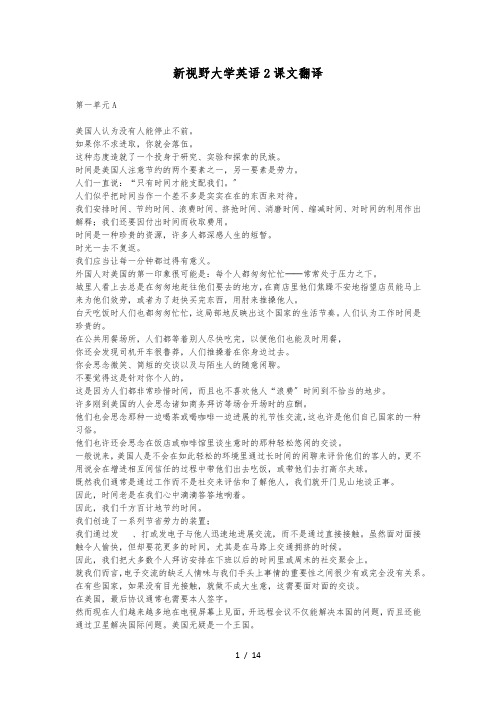
新视野大学英语2课文翻译第一单元A美国人认为没有人能停止不前。
如果你不求进取,你就会落伍。
这种态度造就了一个投身于研究、实验和探索的民族。
时间是美国人注意节约的两个要素之一,另一要素是劳力。
人们一直说:“只有时间才能支配我们。
〞人们似乎把时间当作一个差不多是实实在在的东西来对待。
我们安排时间、节约时间、浪费时间、挤抢时间、消磨时间、缩减时间、对时间的利用作出解释;我们还要因付出时间而收取费用。
时间是一种珍贵的资源,许多人都深感人生的短暂。
时光一去不复返。
我们应当让每一分钟都过得有意义。
外国人对美国的第一印象很可能是:每个人都匆匆忙忙──常常处于压力之下。
城里人看上去总是在匆匆地赶往他们要去的地方,在商店里他们焦躁不安地指望店员能马上来为他们效劳,或者为了赶快买完东西,用肘来推搡他人。
白天吃饭时人们也都匆匆忙忙,这局部地反映出这个国家的生活节奏。
人们认为工作时间是珍贵的。
在公共用餐场所,人们都等着别人尽快吃完,以便他们也能及时用餐,你还会发现司机开车很鲁莽,人们推搡着在你身边过去。
你会思念微笑、简短的交谈以及与陌生人的随意闲聊。
不要觉得这是针对你个人的,这是因为人们都非常珍惜时间,而且也不喜欢他人“浪费〞时间到不恰当的地步。
许多刚到美国的人会思念诸如商务拜访等场合开场时的应酬。
他们也会思念那种一边喝茶或喝咖啡一边进展的礼节性交流,这也许是他们自己国家的一种习俗。
他们也许还会思念在饭店或咖啡馆里谈生意时的那种轻松悠闲的交谈。
一般说来,美国人是不会在如此轻松的环境里通过长时间的闲聊来评价他们的客人的,更不用说会在增进相互间信任的过程中带他们出去吃饭,或带他们去打高尔夫球。
既然我们通常是通过工作而不是社交来评估和了解他人,我们就开门见山地谈正事。
因此,时间老是在我们心中滴滴答答地响着。
因此,我们千方百计地节约时间。
我们创造了一系列节省劳力的装置;我们通过发、打或发电子与他人迅速地进展交流,而不是通过直接接触。
新视野大学英语2 第三版Unit2-3 课文翻译

人文学科:过时了吗?当形势变得困难时,强者会去选学会计。
当就业市场恶化时,许多学生估算着他们不能再主修英语或历史。
他们得学一些能改善他们就业前景的东西。
数据显示,随着学生肩负的学费不断增加,他们已从学习人文学科转向他们相信有益于将来就业的应用科学和“硬”技能。
换言之,大学教育越来越被看成是改善经济而不是替身人类自身的手段。
这种趋势可能会持续,甚至有加快之势。
在未来几年内,由于劳动市场的不景气,人文学科可能会继续其长期低迷的态势。
在上一代大学生中,主修人文学科的学生数跌幅已近50%。
这种趋势会持续、甚至加速的想法是合情合理的。
人文学科曾是大学生活的重要支柱,而今在学生们参观校园的时候,却只是一个小点缀。
现在,实验室要比图书馆更栩栩如生、受人青睐。
在这儿,请允许我为人文学科给人们的生活所增添的真实价值进行支持和宣传。
自古以来,人们一直在思索人类自身具有什么神奇的内力使一些人变得崇高伟大,而使另一些人走向自我毁灭。
几个世纪以来,这股内力被称作很多东西。
著名的心理学家西格蒙德弗洛伊德称之为“潜意识”,或更为人熟知的“本能”。
从一开始,人类这股可以是建设性也可以是毁灭性的内在驱动力,就令我们心驰神往。
这些惊人的、充满内心挣扎的故事形成了世界文化的基础。
历史学家、建筑师、作家、哲学家和艺术家们以故事、音乐、神话、绘画、建筑、雕刻、风景画和传统的形式,捕捉到了这些撞击心灵的文字、形象及内涵。
这些男男女女创造出了具有艺术性的“语言”,帮助我们了解人类的这些强烈愿望,并用以教育一代又一代人。
从古时起开始的这些充满想象的大量作品,正是文明的底蕴,它奠定了人文研究的基础。
学习人文学科会提高我们的阅读和写作能力。
无论我们这一生中从事什么职业,如果我们能读懂复杂的思想并理解它们的内涵,我们都会受益匪浅。
如果我们是在办公室能对这些思想做出写出既明确又简洁的分析的人,我们会有光明的职业前景。
学习人文学科会让我们熟悉表达情感的语言及进行创造的过程。
- 1、下载文档前请自行甄别文档内容的完整性,平台不提供额外的编辑、内容补充、找答案等附加服务。
- 2、"仅部分预览"的文档,不可在线预览部分如存在完整性等问题,可反馈申请退款(可完整预览的文档不适用该条件!)。
- 3、如文档侵犯您的权益,请联系客服反馈,我们会尽快为您处理(人工客服工作时间:9:00-18:30)。
奥ào运yùn会h uì优yōu秀x iù的d e标biāo准zhǔn
奥林匹克运动会依然是一个为竞争而竞争的最纯粹的例子。
运动员们在事业和身体上做出牺牲,他们冒着受伤、受挫和彻底失败的危险,仅仅为了国家和自身的荣誉而竞争。
为了获得这样的荣誉,运动员必须发挥出在自己的项目上的最佳水平,在世界最大的竞技舞台上发挥模范作用。
虽然必须承认,有的运动员利用兴奋剂来提升自己的表现,从而取得优势,但他们从未获得过奥运会所能给予的唯一真正的奖赏,那就是荣誉。
而且他们也从未体验过通过刻苦训练与决心这些美德而获胜所带来的光荣感。
迄今为止,卡尔.刘易斯是奥运会田径项目最伟大的选手,也是奥运会精神的典范。
这不仅是因为他屡屡获得金牌,——刘易斯在四个项目的比赛中获得九枚金牌,在100米短跑和跳远比赛中保持世界纪录——而且是因为他天性中所富有的竞争力和从1984年到1996年间在每一届奥运会上所表现出的竞争和获胜的能力。
如果不是美国拒绝出席1980年奥运会,他也会参加那一年的奥运竞赛。
凭借速度、稳定的发挥,诚实,尤其是获胜的渴望,刘易斯的表现非秒表所能计量,甚至时间也停滞不前。
他要求自己发挥出最佳水平,而他取得好成绩靠的不是服用药物,而是无与伦比的自制力和训练时的完全投入。
令人惊讶的是,卡尔.刘易斯的父母在他年幼时鼓励他去上音乐课,而不是去参加田径训练。
但是他不愿意去,而是把一条胶带粘在地上,以此标出跳远世界纪录的距离,然后以非凡的决心开始向着目标练习跳远。
他的父母评价道:“有些孩子今天想着以后当消防员,明天又梦想成为电影明星。
卡尔决心练习田径,后来始终没有改变。
他说他想成为最好的,就这些。
”他多年的训练和从容的自信为他以后卓越的田径生涯打好了基础。
